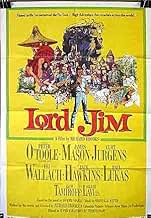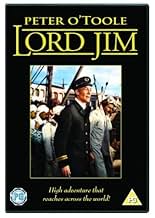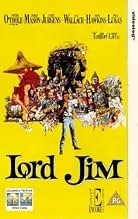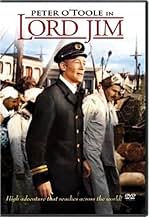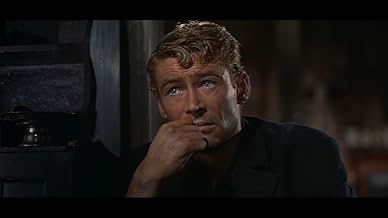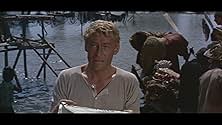IMDb-BEWERTUNG
6,7/10
4447
IHRE BEWERTUNG
Ein Offizier, der wegen Feigheit in Seenot aus der englischen Handelsmarine ausgeschlossen worden ist, versucht seine Ehre wiederherzustellen, indem er sich in abenteuerlichen Herausforderun... Alles lesenEin Offizier, der wegen Feigheit in Seenot aus der englischen Handelsmarine ausgeschlossen worden ist, versucht seine Ehre wiederherzustellen, indem er sich in abenteuerlichen Herausforderungen zu bewähren versucht.Ein Offizier, der wegen Feigheit in Seenot aus der englischen Handelsmarine ausgeschlossen worden ist, versucht seine Ehre wiederherzustellen, indem er sich in abenteuerlichen Herausforderungen zu bewähren versucht.
- Regie
- Drehbuch
- Hauptbesetzung
- Nominiert für 2 BAFTA Awards
- 2 Nominierungen insgesamt
Curd Jürgens
- Cornelius
- (as Curt Jurgens)
Jûzô Itami
- Waris
- (as Ichizo Itami)
Rafiq Anwar
- Moslem Leader
- (as Rafik Anwar)
Empfohlene Bewertungen
I have seen the film three times over the past thirty years and each time I loved it. The subject of the film must have attracted director Richard Brooks who was essentially a screenplay writer who later became a director. He knew the merits of a strong script with philosophical lines from Conrad. Coppola was to use the related original material (Conrad's) in his "Apocalypse Now" for the Brando scenes several decades after this film was made and mostly forgotten.
What Brooks does not realize is that lines like "it only takes a split second to make a coward a hero or turn a hero into a coward" and "every sinner wants a second chance at redemption, without realizing he is damned for ever" are philosophical lines that one expects to hear from very literate individuals. Here, in "Lord Jim," the lines are often spoken by the dregs of society. Jim, of course, we are told by the narrator (Jack Hawkins' Marlowe) was philosophical, dreamed of heroism, and was a gentleman.
The film is made up of three distinct segments: 1. the "sinking" of SS Patna 2. The liberation of Patusan ("Patna" + "us" make up the name Patusan, remarks Jim to his love) and 3. The battle with a group of scoundrels (led by James Mason's 'Gentleman' Brown) with some fine speeches on honor, death, and fear.
Each segment could stand alone but together the film adds considerable worthiness that exceeds the action and plot, the elements that most viewers use to judge a movie. The lesser characters in the film add color and counterpoints to the script. Christian Marquand's French Captain who defends Jim's "cowardice" with the words "fear can make us do strange things" or Paul Lukas' Stern who compares his dead butterfly collection with the "wonderful, perfect human beings that God created" or the native who wonders why some pray to one god instead of a host of Gods are a few examples of dialogs that force you to reflect on what you heard.
The film's subject covers several religions. The fervent Muslims on the way to Haj survive the storm. The Christian Jim prays to his God. The Buddhists pray to Buddha. And the natives pray to their array of gods (a touch of Hinduism?). Yet, the film is not a religious film. But faith in God is underlined at every stage.
Conrad was Polish and a seaman before he became a writer. Brooks is an American. O'Toole leads a cast that is predominantly British. Daliah Lavi is Israeli, Marquand is French, Jurgens is German...The film is truly international.
Brooks not only wrote and directed the film but this was the first film that he produced. The film proved to be ideal for O'Toole reprising his roles of "Lawrence of Arabia" and "Becket", roles that draw thin lines between cowardice and heroism and consequent attempts to redeem oneself. The film is not great cinema--but will remain for me cinema based on related major literary works ("Lord Jim" and "Heart of Darkness", both narrated by the fictional Marlow) adapted for the screen with some delightful performances from O'Toole, Mason, Wallach, and Marquand and commendable photography by Freddie Young.
What Brooks does not realize is that lines like "it only takes a split second to make a coward a hero or turn a hero into a coward" and "every sinner wants a second chance at redemption, without realizing he is damned for ever" are philosophical lines that one expects to hear from very literate individuals. Here, in "Lord Jim," the lines are often spoken by the dregs of society. Jim, of course, we are told by the narrator (Jack Hawkins' Marlowe) was philosophical, dreamed of heroism, and was a gentleman.
The film is made up of three distinct segments: 1. the "sinking" of SS Patna 2. The liberation of Patusan ("Patna" + "us" make up the name Patusan, remarks Jim to his love) and 3. The battle with a group of scoundrels (led by James Mason's 'Gentleman' Brown) with some fine speeches on honor, death, and fear.
Each segment could stand alone but together the film adds considerable worthiness that exceeds the action and plot, the elements that most viewers use to judge a movie. The lesser characters in the film add color and counterpoints to the script. Christian Marquand's French Captain who defends Jim's "cowardice" with the words "fear can make us do strange things" or Paul Lukas' Stern who compares his dead butterfly collection with the "wonderful, perfect human beings that God created" or the native who wonders why some pray to one god instead of a host of Gods are a few examples of dialogs that force you to reflect on what you heard.
The film's subject covers several religions. The fervent Muslims on the way to Haj survive the storm. The Christian Jim prays to his God. The Buddhists pray to Buddha. And the natives pray to their array of gods (a touch of Hinduism?). Yet, the film is not a religious film. But faith in God is underlined at every stage.
Conrad was Polish and a seaman before he became a writer. Brooks is an American. O'Toole leads a cast that is predominantly British. Daliah Lavi is Israeli, Marquand is French, Jurgens is German...The film is truly international.
Brooks not only wrote and directed the film but this was the first film that he produced. The film proved to be ideal for O'Toole reprising his roles of "Lawrence of Arabia" and "Becket", roles that draw thin lines between cowardice and heroism and consequent attempts to redeem oneself. The film is not great cinema--but will remain for me cinema based on related major literary works ("Lord Jim" and "Heart of Darkness", both narrated by the fictional Marlow) adapted for the screen with some delightful performances from O'Toole, Mason, Wallach, and Marquand and commendable photography by Freddie Young.
It is sometime in the late 19th century, and Jim is an up-and-coming merchant seaman. After rising through the ranks under Captain Marlowe, Jim is injured and stranded in Java. After recovering, he signs on with the first available ship: the SS Patna, bound for Mecca with hundreds of pilgrims. During a storm, the crew abandon it, thinking it will surely sink, and in a moment of weakness; Jim joins them. Back in port, they realise the ship was saved, and Jim's guilt impels him to turn himself in. After a public humiliation at an official inquiry, Jim becomes a drifter in the Asiatic waters; determined to one day restore honour to his good name.
Written and directed by Richard Brooks- and based on Joseph Conrad's novel of the same name- 'Lord Jim' is a grandly photographed adventure that is enjoyable, though doesn't live up to its source material. Despite Brooks' best efforts, he fails to recapture the psychological intrigue and headily atmospheric nature of the novel. His version of the story is more of a straight adventure piece, missing the subtle, profound examinations of guilt and honour that made up the dark heart of Conrad's tale.
This is not to say the film isn't worthwhile, however. Though it culminates with a dull battle sequence, and the pacing is sluggish in places, 'Lord Jim' still engages and entertains. Brooks' dialogue and characterisation is strong, while the portrayal of the colonial attitudes of the time is striking and powerful. Despite the fact that his handling of the novel's themes feels lightweight, the central message about redemption and dignity still comes across; albeit a little watered down.
Furthermore, Freddie Young's immersive colour cinematography gives the film a crisp look and an epic feel. He successfully captures the contrast between the different settings of the film, from the bustling port of Java to the exotic, remote village of Patusan. His utilisation of various camera angles and movements creates dynamic, dramatic scenes, whether it be the stormy night on the Patna, the tense trial of Jim, or the final showdown. Young's consummate work enhances the mood and tone of the film, making it a visually stunning spectacle.
Conversely, Alan Osbiston's ponderous editing lends proceedings a sluggish pace, which is most evident in the latter half of the film. Though just under two and a half hours, 'Lord Jim' feels more protracted than it should have. On the other hand, Bronislaw Kaper's score is atmospheric and stirring, giving life to even the most lethargic of scenes, complementing the fine work of the aforementioned Young.
Also worthy of praise is the cast, led by a pitch-perfect Peter O'Toole. There were- and still are- few actors who could inject the same degree of intensity into their performances as O'Toole did, time and time again. As Jim, he enthralls with his obsessive desire to clear his name of dishonour, and his co-stars prove to be equally impressive. Eli Wallach does typically fine work as the villainous warlord The General, while Curd Jürgens steals every scene he's in as the duplicitous, drunken Cornelious. Moreover, James Mason's turn as the oily, cut-throat bandit Gentleman Brown may make your skin actually crawl; and is the main highlight of the uneven latter half.
In conclusion, Richard Brooks' adaptation of Joseph Conrad's 'Lord Jim' is a mixed-bag if ever there was one. Though Conrad's fascinating tale of guilt, honour and redemption is slightly truncated, it is not totally lost in translation; and the film still packs a narrative punch. Freddie Young's cinematography is captivating, while Bronislaw Kaper's score is stirring and the performances are of a particularly high quality- especially that of star Peter O'Toole. At the end of the day, though it goes through some choppy waters, 'Lord Jim' is still a cruise you should embark on.
Written and directed by Richard Brooks- and based on Joseph Conrad's novel of the same name- 'Lord Jim' is a grandly photographed adventure that is enjoyable, though doesn't live up to its source material. Despite Brooks' best efforts, he fails to recapture the psychological intrigue and headily atmospheric nature of the novel. His version of the story is more of a straight adventure piece, missing the subtle, profound examinations of guilt and honour that made up the dark heart of Conrad's tale.
This is not to say the film isn't worthwhile, however. Though it culminates with a dull battle sequence, and the pacing is sluggish in places, 'Lord Jim' still engages and entertains. Brooks' dialogue and characterisation is strong, while the portrayal of the colonial attitudes of the time is striking and powerful. Despite the fact that his handling of the novel's themes feels lightweight, the central message about redemption and dignity still comes across; albeit a little watered down.
Furthermore, Freddie Young's immersive colour cinematography gives the film a crisp look and an epic feel. He successfully captures the contrast between the different settings of the film, from the bustling port of Java to the exotic, remote village of Patusan. His utilisation of various camera angles and movements creates dynamic, dramatic scenes, whether it be the stormy night on the Patna, the tense trial of Jim, or the final showdown. Young's consummate work enhances the mood and tone of the film, making it a visually stunning spectacle.
Conversely, Alan Osbiston's ponderous editing lends proceedings a sluggish pace, which is most evident in the latter half of the film. Though just under two and a half hours, 'Lord Jim' feels more protracted than it should have. On the other hand, Bronislaw Kaper's score is atmospheric and stirring, giving life to even the most lethargic of scenes, complementing the fine work of the aforementioned Young.
Also worthy of praise is the cast, led by a pitch-perfect Peter O'Toole. There were- and still are- few actors who could inject the same degree of intensity into their performances as O'Toole did, time and time again. As Jim, he enthralls with his obsessive desire to clear his name of dishonour, and his co-stars prove to be equally impressive. Eli Wallach does typically fine work as the villainous warlord The General, while Curd Jürgens steals every scene he's in as the duplicitous, drunken Cornelious. Moreover, James Mason's turn as the oily, cut-throat bandit Gentleman Brown may make your skin actually crawl; and is the main highlight of the uneven latter half.
In conclusion, Richard Brooks' adaptation of Joseph Conrad's 'Lord Jim' is a mixed-bag if ever there was one. Though Conrad's fascinating tale of guilt, honour and redemption is slightly truncated, it is not totally lost in translation; and the film still packs a narrative punch. Freddie Young's cinematography is captivating, while Bronislaw Kaper's score is stirring and the performances are of a particularly high quality- especially that of star Peter O'Toole. At the end of the day, though it goes through some choppy waters, 'Lord Jim' is still a cruise you should embark on.
Moving story of an idealistic seaman forced to deal with his act of cowardice and how he ultimately redeems himself. The film has good action sequences and a moving love story. Performances by Eli Wallach and James Mason are colorful and solid, and there are plenty of Peter O'Toole's trademark "vacant stares". Daliah Lavi is gorgeous and her role more substantive than those of her other films. I love Peter O'Toole's films from this period (Lawrence of Arabia, What's New Pussycat?, Night of the Generals) and this one is as good as most of them. I looked for this film on DVD and finally had to tape it off of AMC (in the good old days before they saturated their programing with commercials). I'd like to see it restored and re-released.
Based on the novel, this movie is not only representative of the period piece that Joseph Conrad's story was, but also of movie-making at that time (1965). It's an epic story told in the way that they did back then --sweeping landscapes, exotic locales, hundreds of extras, good performances and many questions regarding philosophical and practical values. At times a bit clunky and unexplained, the movie is a study in movie-making during that era.
It brings up the same issues that Conrad did in his book, sometimes so much so that the dialog feels as though it is dragging. O'Toole's character emotes plenty, despite acting flat for a good portion of the first third. The scene between him and James Mason is the spark of the piece. At 2:34, this movie flounders and drags in the middle. Still, it's a good piece to watch.
It brings up the same issues that Conrad did in his book, sometimes so much so that the dialog feels as though it is dragging. O'Toole's character emotes plenty, despite acting flat for a good portion of the first third. The scene between him and James Mason is the spark of the piece. At 2:34, this movie flounders and drags in the middle. Still, it's a good piece to watch.
The double edge of humanity: fear and courage. In his darkest hour, Lord Jim finds a redeeming path of self-sacrifice facing his past and the burden of a dramatic split-second decision. A coward´s decision aboard the Patna? Heroes before the action, dreaming of epic challenges often "freeze" in the face of danger. The survival instinct is in clear contradiction to the strong desire of young Jim to do good. Peter o´Toole reveals a dramatical and deep performance, outstandingly faithful to Conrad´s masterpiece. James Mason is superb giving life to an ignominious as well as charming dark face of evil. The vivid colour of the jungle and the thick river myst create the perfect atmosphere for this dark novel(with a major future influence in Coppola´s "Apocalypse now"). In this film you can see portrayed the all time dilema of our lives. Everyone in his or her lifetime will sometimes have to make a decisive split-second decision, that will change irreversibly his life and that of others. If it is the wrong decision, will we ever have a chance of redemption?
Wusstest du schon
- WissenswertesThe crew and cast were joined by Cambodian translator Dith Pran, who was a liaison between Cambodians and the filmmakers and stars. He left the country after the 1975 Communist takeover and his own imprisonment, and his story was told in Killing Fields - Schreiendes Land (1984).
- PatzerWhen Jim is going up river, one of his companions throws a knife into another's back, but the knife is already in his back as he turns to warn Jim.
- VerbindungenFeatured in Ein Draufgänger in New York (1982)
Top-Auswahl
Melde dich zum Bewerten an und greife auf die Watchlist für personalisierte Empfehlungen zu.
Details
- Laufzeit2 Stunden 34 Minuten
- Seitenverhältnis
- 2.20 : 1
Zu dieser Seite beitragen
Bearbeitung vorschlagen oder fehlenden Inhalt hinzufügen




